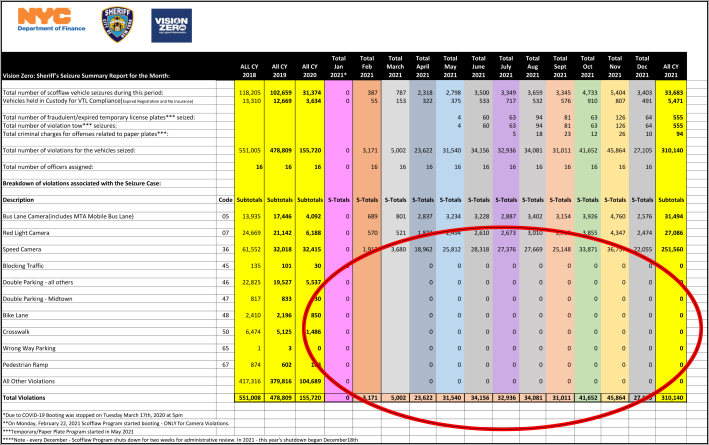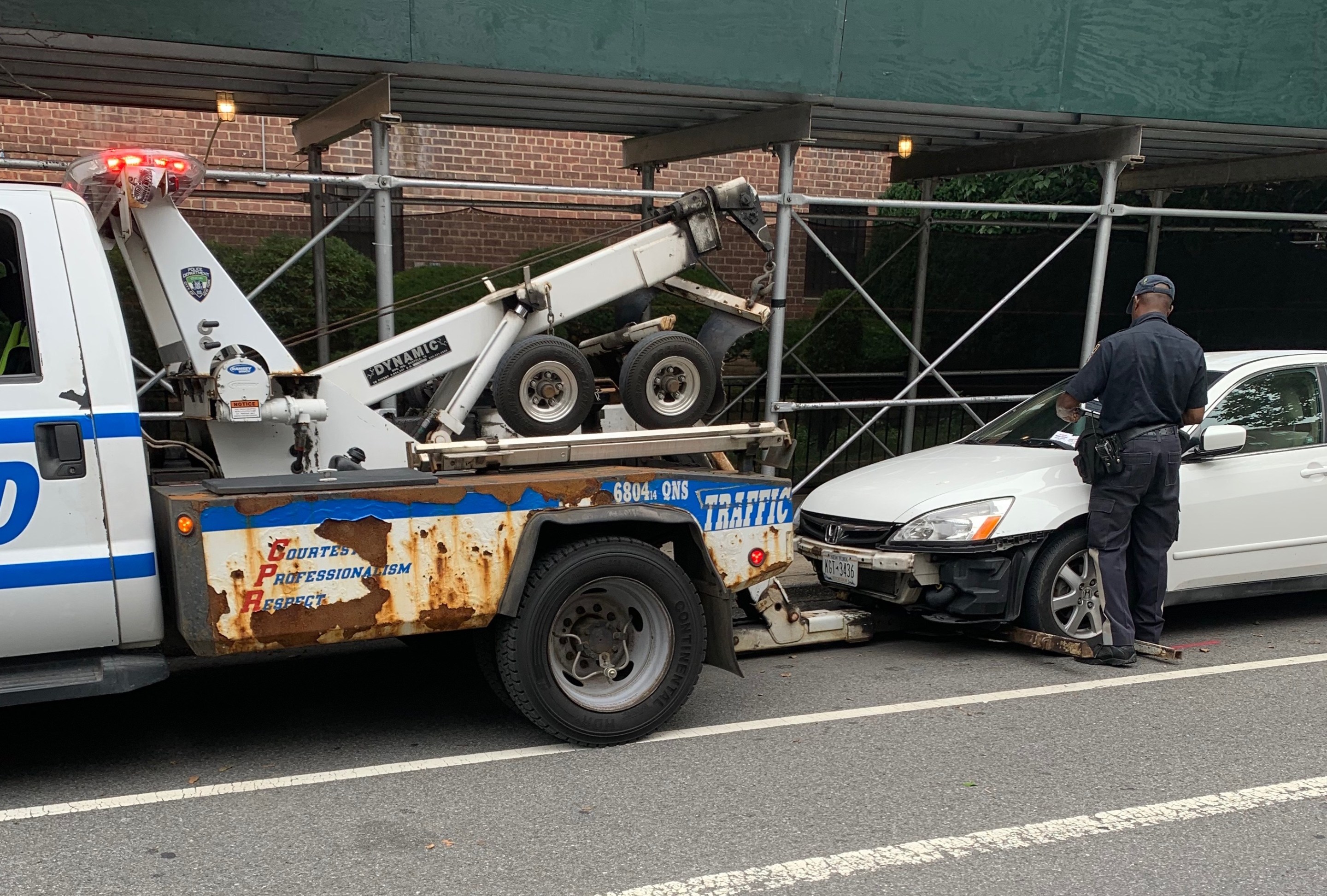The city has still not resumed hauling away the cars of tens of thousands of scofflaw drivers who rack up (and then don't pay) multiple infractions for their dangerous driving or also-dangerous selfishness — despite 2021 ending as the bloodiest year for road violence since 2013.
At the start of the Covid-19 pandemic in March, 2020, the Department of Finance paused booting and towing cars that met the threshold for punishment: more than $350 tickets that were neither paid nor disputed within 100 days, according to the agency. The city restarted seizing cars in February, 2021, but has limited the removals and booting only to cars with camera-issued violations, such as running a red light, speeding or blocking a bus lane.
Nearly two years since the pause, towing for all other violations, including blocking traffic, double parking, or blocking bike lanes and crosswalks, remains on hold — meaning that thousands of motorists who in the past had been towed away for failing to pay their tickets for blocking bike lanes, double-parking, blocking crosswalks or other violations are not being towed anymore.
Here's how the numbers break down, with data provided by the Department of Finance, which oversees the Sheriff:
- In 2018, the city seized 118,205 cars, of which 2,410 had violations for blocking bike lanes.
- In 2019, the city seized 102,659 cars, of which 2,196 had violations for blocking a bike lane.
- In 2020, the number of seized cars plummeted to 31,374, with roughly 900 of them towed because of blocking bike lanes before the program was shut down due to the pandemic.
- In 2021, towing did not rebound to normal: just 33,683 vehicles were seized, with none removed for blocking bike lanes or any other non-camera violation.
And the failure to restart the program is not only putting people at risk, but continuing to rob the city of millions of dollars in revenue, Streetsblog previously reported.
Some towing has returned, thanks to the city's automated enforcement system that features 750 school-zone camera systems to catch speeders, plus hundreds of red-light cameras and on-bus and stationary bus lane violation cameras.
The cameras are the sole component right now of the city's effort to remove dangerous drivers. Even as fewer cars are being towed than in years past, the cars that are being seized have far more camera-generated tickets than in prior years, when the city was still towing cars for non-camera offenses.
In 2019, for example, the 102,659 seized vehicles had racked up 21,142 camera-issued red light tickets, 32,018 camera-issued speeding tickets and 17,446 bus lane tickets — a ratio of 0.7 camera-issued tickets per car. But in 2021, the mere 33,683 cars that were seized had a whopping 251,560 speed camera, 27,086 red light and 31,494 bus lane tickets — a ratio of more than nine tickets per car.

The failure to tow away cars of drivers who block bike lanes, double park or impede traffic flow could have deadly implications. Improperly parked vehicles have led to dozens of deaths over the years, including that of Madison Lyden on Central Park West in 2018, who was killed by a truck driver after she was forced to navigate her bike into traffic to avoid an Uber driver stopped illegally in the bike lane.
"Driver accountability programs — including the option of vehicle seizure — are effective ways to reduce repeat offenses by reckless drivers, but they need to be effectively funded and managed," said Marco Conner DiAquoi, the deputy director for Transportation Alternatives. "We look forward to working with the new administration and City Council on measures that ensure accountability for reckless drivers, get dangerous drivers off the road, and expand investment in physical safety infrastructure on our streets."
The dangers of a halted towing program were also evident in the case of Tyrik Mott, the recidivist reckless driver who killed 3-month-old Apolline Mong-Guillemin in a crash in Clinton Hill on Sept. 11. Mott should never have been on the road that day; in the course of racking up close to 100 red-light and speed-camera tickets since 2017, he had at least $1,928 in unpaid tickets — more than five times the threshold for towing or booting. But Mott's out-of-state-plated Honda was neither towed nor booted.
A spokesperson for the Department of Finance declined to say when the full towing program will be restored.
In the meantime, advocates frequently point out that the best program to rid the city of dangerous drivers is to redesign roads so they don't need to be enforced.
“A significant expansion of street redesigns is the best way to slow down drivers and prevent traffic violence from occurring in the first place,” Conner DiAquoi said.






